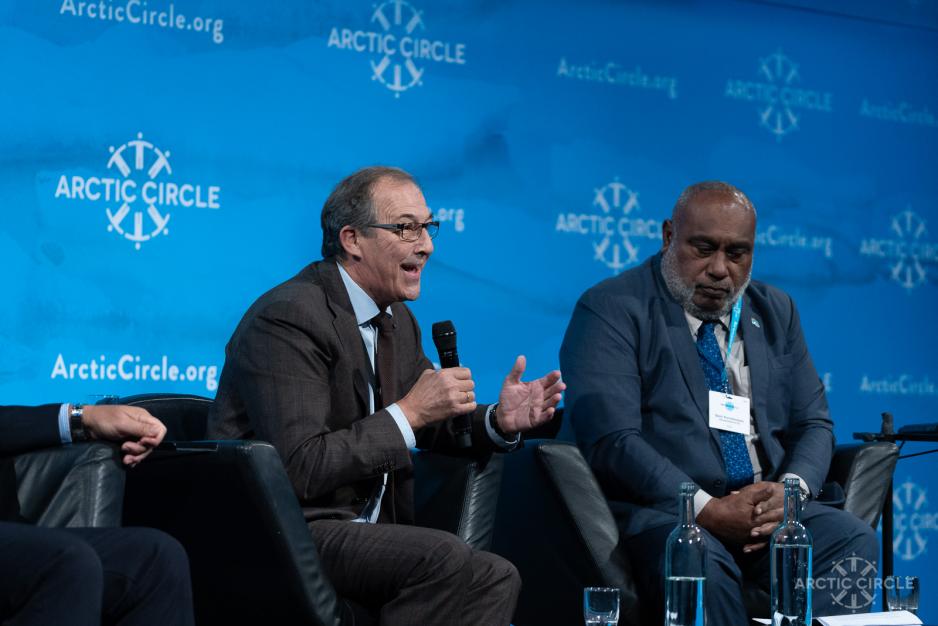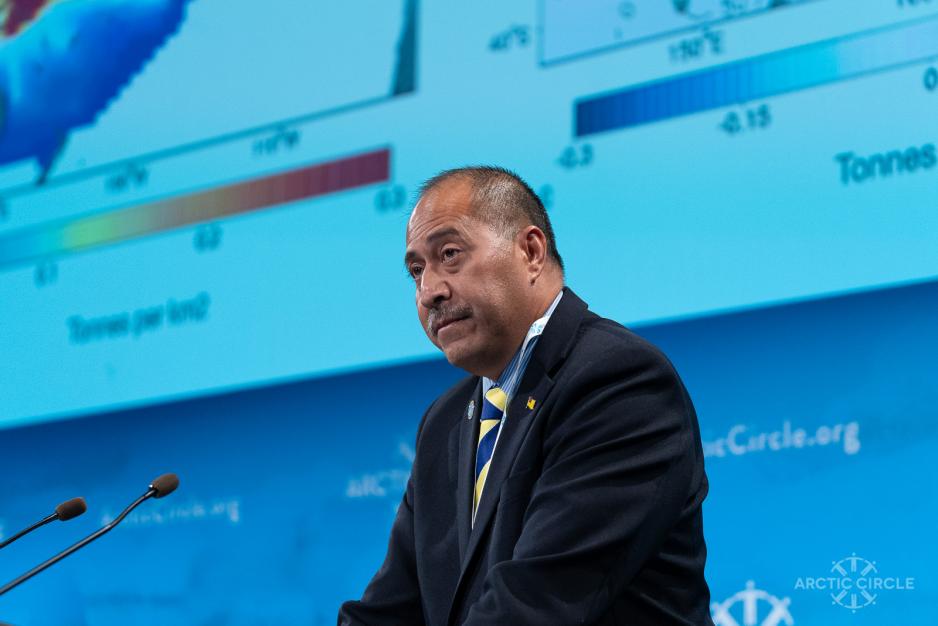From the Central Pacific to the Arctic

Jóhann Sigurjónsson, Special Envoy on Ocean Affairs, Ministry for Foreign Affairs, Iceland, chaired a panel with Ministers from Fiji (pictured) and Niue. (Photo credit: Arctic Circle Secretariat)
Impacts of climate change intimately link the Central Pacific and the Arctic, argue delegates from Fiji and Niue.
Even though Reykjavik does boast a geothermal beach, the frigid North Atlantic surrounding Iceland is a far cry from the tropical waters of the central Pacific. Yet there are compelling reasons why a ministerial delegation from Fiji and Niue would choose to visit Iceland.
All three are small island states with extensive maritime zones. All three rely to a significant degree on fisheries for government revenues, employment, and economic development more generally. Finally, all three are expected to be greatly affected by climate change as fish stocks move, natural disasters intensify, and sea levels rise.
Beyond a bilateral visit to Iceland, the delegation spoke at the Arctic Circle Assembly in a plenary session on the impact of climate change on Pacific Island fisheries organized by Conservation International. Expanding on their reasons for coming to an Arctic forum in an interview with High North News, both ministers hammered home the importance of addressing climate change and implementing the Paris Agreement.
Linking the Pacific and the Arctic
The many differences between Pacific Island states and the Arctic aside, the ministers from Fiji and Niue underlined how climate change and its impacts intimately bind the two regions together.
At an existential level, as Arctic ice melts it raises sea levels around the world to the point where certain states may cease to exist. The nation of Kiribati estimates that by 2050 the atoll of Tarawa, home to almost half the country’s population, could be critically threatened by rising sea levels.
The threat is such that, in 2014, Kiribati purchased land on the Fijian island of Vanua Levu should they be forced to permanently relocate.
According to the Minister for Natural Resources from Niue, Dalton Tagelagi, the urgency of this situation does not always resonate in other parts of the world.
I’m not sure if people really see the magnitude of the consequences of ice melting. I don’t have the feeling that there is a proper understanding.
“I’m not sure if people really see the magnitude of the consequences of ice melting. I don’t have the feeling that there is a proper understanding,” he notes. “Everyone is talking about it—but we need to address things now without waiting until the crisis at the end.”
Not limited to island states far from the poles, some communities in the Arctic have already confronted the reality of relocation. Thawing permafrost and coastal erosion prompted the community of Shishmaref, Alaska, to vote to relocate further inland three times (most recently in 2016).
Pithily summarizing the link between the two regions, the Minister of Fisheries from Fiji, Semi Koroilavesau, explained that “the issues are the same.”
Raising the profile of the Pacific Islands
With small populations and limited resources available to spend on international relations, many small Pacific island states struggle to get their voices heard in global debates. In the past, they have employed innovative approaches to overcome this diplomatic gap.
Perhaps the most well-known of these efforts was the High Ambition Coalition initiated by the Foreign Minister of the Marshall Islands in the lead up to the Paris Agreement. Championing the “1.5˚ C to stay alive” slogan, the campaign gained momentum and ultimately influenced both the style and content of the Agreement.
In the chaos that followed the US withdrawal from the Paris Agreement, there is a sense that the Pacific perspective—and the urgency it carries—has been lost in larger climate debates.
This poses a serious challenge according to Mr. Koroilavesau. Not only does this restrict invaluable information on climate change to the Pacific Island region, it also means that there can be a lack of understanding at the international level about the specific challenges faced by these communities.

The Minister for Natural Resources of Niue, Dalton Tagelagi, spoke to tuna fisheries in the Pacific (Photo credit: Arctic Circle Secretariat)
Niue is a case and point. A state in free association with New Zealand, the island is home to roughly 1,700 people and has only established formal diplomatic ties with 21 countries. As Mr. Tagelagi readily admits, “diplomatic relations are something new for us.”
As such, the opportunity to speak at forums such as the Arctic Circle Assembly are an important way to inject these voices into the debate—both internationally and in the Arctic. The Minister from Niue emphasizes this, noting that it fosters understanding: “they’ll say okay, we’re aware of the situation, because we have built that partnership.”
A sovereign state with a population of just under a million, Fiji is, in some respects, at the other end of the spectrum in the Pacific. It has a larger capacity to engage at the international level—a position it has consistently used to advocate on behalf of the whole region.
As Mr. Koroilavesau explains, “Fiji has made this a focus … the government has made it a point to—whenever we are represented in an international forum—highlight the difficulties facing smaller nations. We focus on the fact that the Pacific is in trouble.”
We need to look after the people who are sinking under the ocean.
This came across clearly at the Arctic Circle Assembly where the minister underlined that the situation is continually getting worse, emphasizing that “We need to look after the people who are sinking under the ocean.”
A message to the Arctic and the world
While the ministers spoke to a wide range of subjects during the assembly and over the course of the interview, they were both emphatic in the message they wanted to project to the attendees of the Arctic Circle Assembly and the world more generally.
For Mr. Tagelagi, the Minister of Natural Resources from Niue, the Arctic Circle Assembly was, in particular, a chance to build empathy for the challenges posed by climate change for Pacific nations. It is an opportunity to enable people “to understand our situation and where we come from—that is the key that we’re delivering.”
This process does not only unfold from North to South: it is also about understanding what is going on in the Arctic and recognizing how both communities can help each other in the face of climate change. As Mr. Tagelagi points out, “The good thing about being here is understanding what they’re going through in this part of the world and where we can help them as well.”
Mr. Koroilavesau, for his part, did not mince words in taking to task climate deniers: “My simple message is that climate change is real, and we need to work on trying to limit it to 1.5 degrees.”
